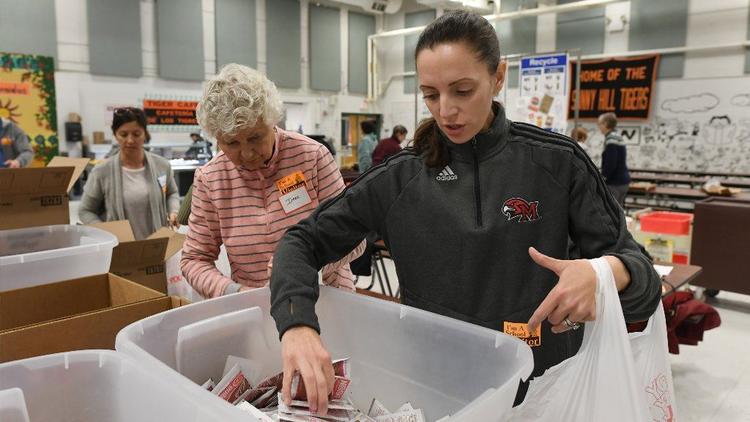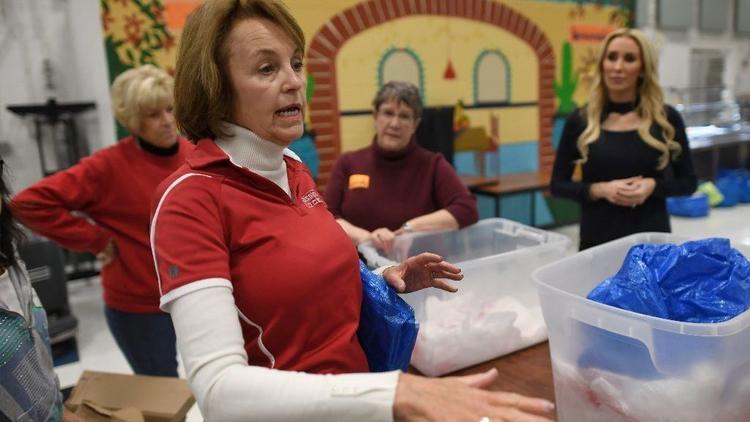Blessings in a Backpack Provides Food for 700 Kids in Barrington School District 220

Phil Rockrohr is a freelance reporter for Pioneer Press.
On a Thursday morning earlier this month, volunteers from Barrington Community Unit School District 220 began trickling into Sunny Hill Elementary School in Carpentersville.
Each began opening dozens of boxes of packaged food and spreading the boxes across three rows of tables. By 9:15 a.m., 20 volunteers had arrived and were packing the food in plastic bags to be delivered to about 700 kids across the district’s 12 schools, said Claudia Gerrard, co-chair of the Barrington area’s Blessings in a Backpack program.
Blessings in a Backpack volunteers take each plastic bag of food and place it in the backpack, to be distributed to students who qualify for the national free or reduced-cost lunch program, Gerrard said.
The idea is to give the students food to eat at home each weekend, she explained.

“A really important angle is that this is a very multicultural, multi-ethnic program,” Gerrard said. “We have volunteer moms who bring in their 2-year-olds. We have grandmas that walk here and don’t speak English. They help even though they don’t have kids in school anymore. People just want to give back. They don’t want to just keep taking.”
According to the school district’s report card from the Illinois State Board of Education, 19 percent of the more than 8,700 students enrolled in School District 220 come from low-income families and qualify for free or reduced-price lunch.
Angela Katula, who recently moved to Barrington from Wauwatosa, Wis., said she volunteered with similar programs in Milwaukee. Katula, who has two children at Station Middle School in Barrington, came for the first time Thursday to meet people and help out.
“I’ve worked in schools before,” she said. “I need to fill my time and thought I’d do something nice. It’s a wonderful program.”
Gayle Mack, a semi-retired mom of one School District 220 graduate from Lake Barrington, decided to get involved five years ago when she and her husband, Steve, learned about the Blessings in a Backpack program during a video presentation at Barrington Children’s Charities’ annual Holly Ball.
“We were both scaling back from our corporate jobs,” Mack said. “I thought, ‘This is a great way to give back to the community.’ I’ve benefited from living in this environment. I realized not everyone goes to Aspen for spring break. I knew there was a need.”
Although Barrington Children’s Charities foots the bill for the program’s regular costs of $80,000 to $100,000 a year, the Macks chose in December to do something special for each participating student by buying and placing packages of hot chocolate in their bags, Mack said.
Sue Hyde, the other co-chair of the program, said Blessings in a Backpack began about seven years ago at Sunny Hill with about 300 students. Since then it has expanded almost every year to the point where it will serve about 800 in February, Gerrard said.
Hyde credits Gerrard with identifying the need for the program while volunteering at Sunny Hill. Hyde said she had a relationship with Barrington Children’s Charities and the agency agreed to fund the program in its entirety.
Darby Hills, president and co-founder of Barrington Children’s Charities, said Gerrard noticed that some kids didn’t have snacks and were hungry at school.
“We wondered how kids were eating when they were not at school,” Hills said. “We learned about Blessings in a Backpack and wanted to bring it to the community. So we started up the program.”
The national program fit Barrington Children’s Charities perfectly because the local organization’s mission is to address the social, emotional, physical and educational needs of children in District 220, she said.
“It’s very substantial,” Darby, who now serves on the board of the national Blessings in a Backpack organization, said of the local program. “We feed an entire school district. We’re the only organization that does that in the country.”
With its most recent expansion, the program will cost about $100,000 a year, she said. Sunny Hill, where 90 percent of the students receive a free or reduced-cost lunch, was just the tip of the iceberg, Darby said.
“Then we learned there was a need at every school, so we expanded it to include all of the eight elementary schools,” she said. “As it grew, children went on to middle school and high school. There was a concern that students were getting bags in elementary school, but not at the middle school and high school levels. Now we’re providing to all the kids that need them.”

